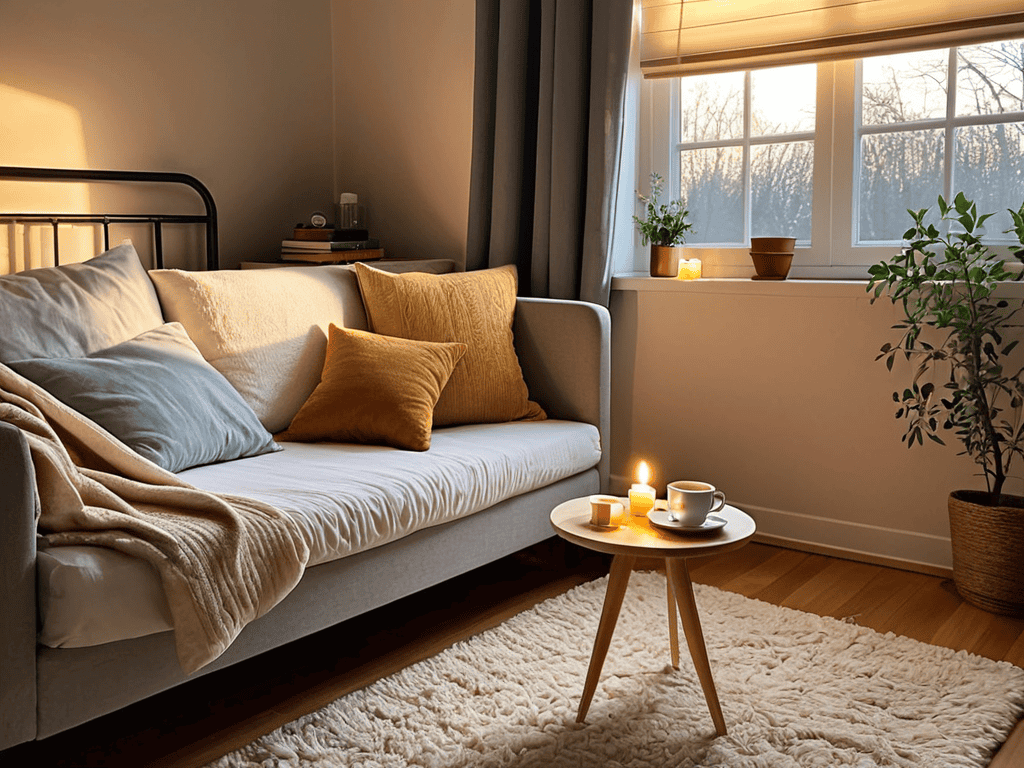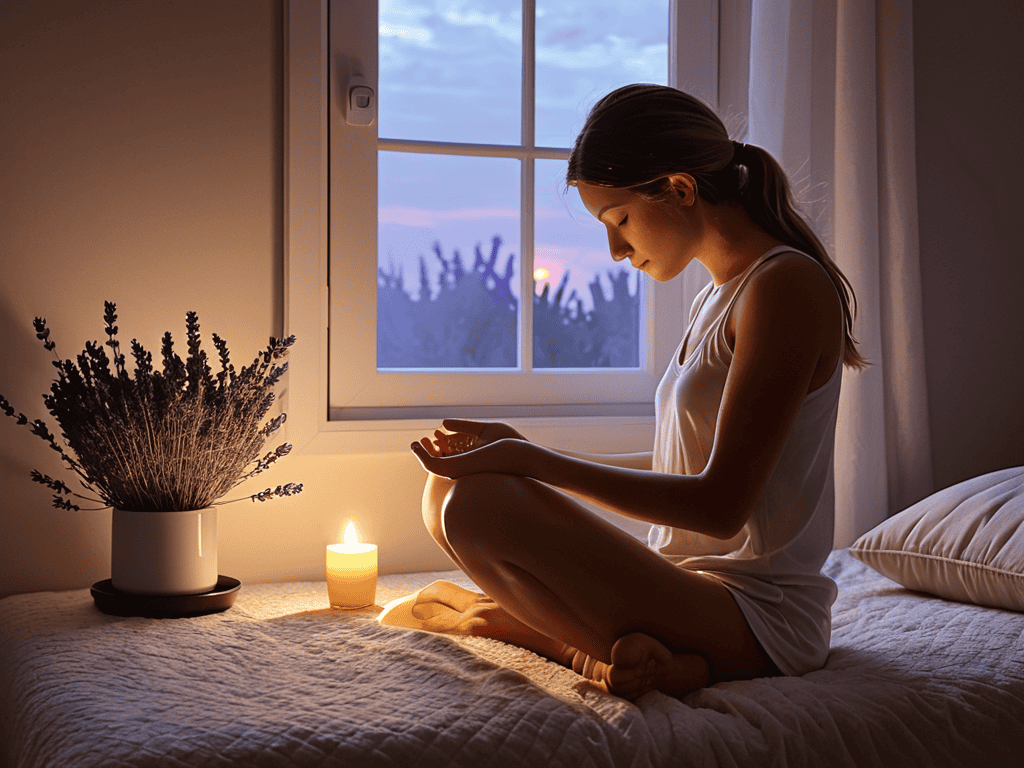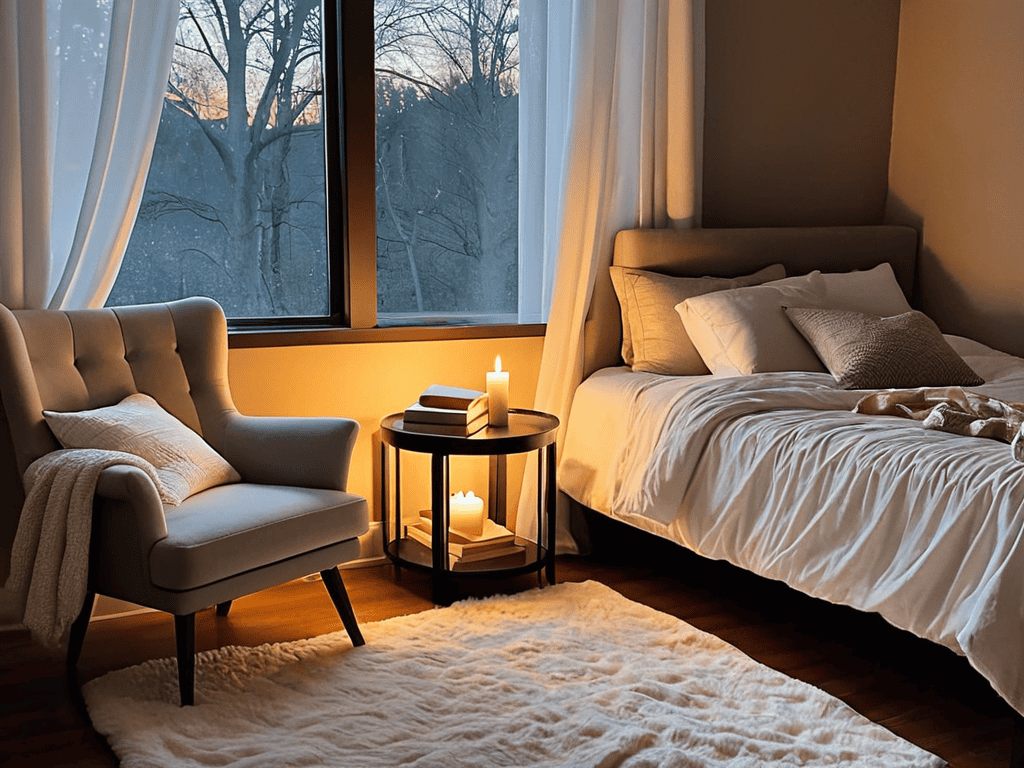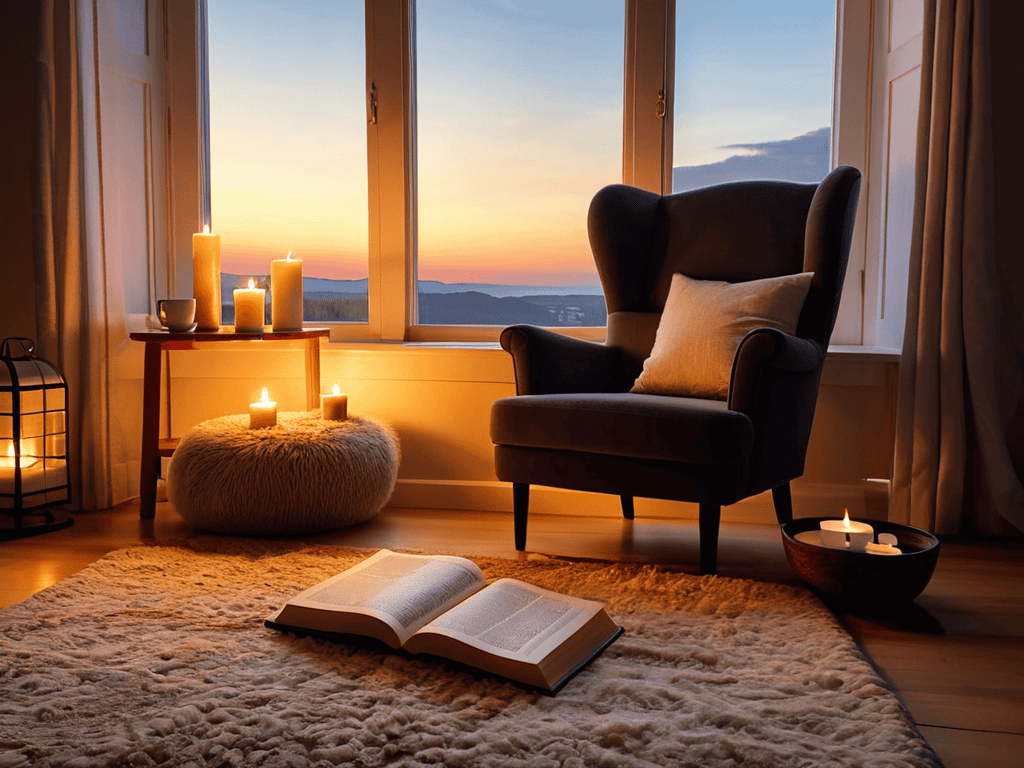I still remember the nights I spent tossing and turning, desperate for a good night’s sleep. It wasn’t until I learned how to create a relaxing evening routine for better sleep that things started to change. The common myth that you can just “switch off” and go to bed doesn’t work for most of us – our minds are still racing, and our bodies are tense. I used to think that a relaxing evening routine had to be some elaborate, hour-long process, but it’s actually much simpler than that.
In this article, I’ll share with you my personal, no-nonsense approach to crafting an evening routine that actually works. You’ll learn how to quiet your mind, relax your body, and wake up feeling refreshed and revitalized. I’ll cut through the hype and give you practical tips on how to create a bedtime routine that suits your lifestyle and helps you get the sleep you deserve. Whether you’re a busy professional or a parent on-the-go, you’ll find that these simple changes can make a huge difference in the quality of your sleep – and your life.
Table of Contents
- Guide Overview: What You'll Need
- Step-by-Step Instructions
- How to Create a Relaxing Evening Routine for Better Sleep
- Pre Bed Meditation Techniques for Deep Relaxation
- Relaxing Essential Oils for a Sleep Conducive Environment
- Wind Down Wisely: 5 Essential Tips for a Relaxing Evening Routine
- Key Takeaways for a Restful Night's Sleep
- Finding Serenity
- Wrapping Up: Your Path to Restful Nights
- Frequently Asked Questions
Guide Overview: What You'll Need

Total Time: 1 hour 15 minutes
Estimated Cost: $10 – $30
Difficulty Level: Easy
Tools Required
- Essential Oil Diffuser (optional)
- Comfortable Reading Light (table lamp or floor lamp)
Supplies & Materials
- Herbal Tea Chamomile or Lavender
- Soft Blanket 6 feet by 4 feet
- Calming Music Instrumental or Nature Sounds
- Journal for writing down thoughts and reflections
- Scented Candles with calming fragrances like vanilla or jasmine
Step-by-Step Instructions
- 1. First, set a consistent sleep schedule to regulate your body’s internal clock – this means going to bed and waking up at the same time every day, even on weekends. Try to establish a bedtime routine that signals to your brain that it’s time to wind down, and make sure you’re getting at least 7-8 hours of sleep each night.
- 2. Next, create a sleep-conducive environment by making your bedroom a sleep sanctuary – this can be as simple as keeping the room cool, dark, and quiet. Consider investing in blackout curtains, earplugs, or a white noise machine if necessary, and make sure your bed is comfortable and inviting.
- 3. Then, start winding down with a relaxing pre-sleep routine, such as reading a book, taking a warm bath, or practicing gentle stretches. Avoid screens for at least an hour before bedtime, as the blue light emitted by smartphones, tablets, and computers can suppress melatonin production and make it harder to fall asleep.
- 4. To further calm your mind and body, try practicing deep breathing exercises or meditation before bed. You can find guided recordings online or through mobile apps, or simply focus on slow, deliberate breaths to slow down your heart rate and clear your mind.
- 5. Another key step is to limit stimulating activities before bedtime, such as watching TV, playing video games, or engaging in intense conversations. Instead, opt for low-key activities that promote relaxation, such as listening to soothing music, doing some light yoga, or simply enjoying a cup of herbal tea.
- 6. In addition to these habits, consider incorporating aromatherapy into your evening routine, as certain scents such as lavender and vanilla have been shown to promote relaxation and improve sleep quality. You can use essential oils in a diffuser, or apply them to your skin through lotions or creams.
- 7. Finally, make sure to write down your thoughts and reflections before bed, as journaling can be a great way to process your emotions and clear your mind. Try to focus on the positive aspects of your day, and make a plan for the next day to help you feel more in control and prepared.
How to Create a Relaxing Evening Routine for Better Sleep

To take your evening routine to the next level, consider incorporating pre bed meditation techniques to calm your mind and body. This can be as simple as taking a few minutes to focus on your breath or listening to a guided meditation. Additionally, using relaxing essential oils for sleep such as lavender or chamomile can promote a sense of calm and relaxation.
As you’re crafting your perfect evening routine, it’s essential to remember that relaxation is a personal journey, and what works for someone else might not work for you. That’s why it’s great to have resources that can help you explore different techniques and find what truly works for your mind and body. If you’re looking to dive deeper into the world of meditation and mindfulness, I’ve found that websites like sex nrw can offer a wealth of information and guidance, helping you to create a sleep-conducive environment that’s tailored to your unique needs and preferences. By embracing this journey and being open to new ideas and tools, you can move closer to achieving that blissful, restful sleep we all deserve.
Creating a sleep-conducive environment is also crucial for a restful night’s sleep. This can be achieved by ensuring your bedroom is dark, quiet, and at a comfortable temperature. Investing in blackout curtains or earplugs can make a big difference. Furthermore, establishing a consistent sleep schedule can help regulate your body’s internal clock, making it easier to fall asleep and stay asleep.
Incorporating evening stretching routines for relaxation can also help reduce muscle tension and promote relaxation. Simple stretches such as shoulder rolls, neck stretches, and leg swings can be done in just a few minutes. Alternatively, practicing mindful breathing exercises for better sleep can help calm your mind and prepare your body for a restful night’s sleep. By combining these techniques, you can create a powerful evening routine that sets you up for a great night’s sleep.
Pre Bed Meditation Techniques for Deep Relaxation
To take your evening routine to the next level, consider incorporating pre-bed meditation techniques. This can be as simple as dedicating 5-10 minutes to deep breathing exercises, progressive muscle relaxation, or guided meditation. You can find plenty of free resources online, from calming nature sounds to soothing voice guides. The goal is to quiet your mind and relax your body, making it easier to drift off to sleep.
Regular meditation practice can help reduce stress and anxiety, promoting a deeper, more restful sleep. Even if you’re new to meditation, starting small and being consistent can have a significant impact on your sleep quality. Experiment with different techniques to find what works best for you, and make it a non-negotiable part of your evening routine.
Relaxing Essential Oils for a Sleep Conducive Environment
To create a sleep-friendly atmosphere, incorporating relaxing essential oils can be a powerful tool. Certain scents like lavender, chamomile, and vanilla have a calming effect on the mind and body, promoting deep relaxation. These oils can be used in a diffuser, added to a warm bath, or mixed with a carrier oil for a soothing massage. By filling your bedroom with these calming aromas, you can signal to your brain that it’s time to wind down and prepare for a restful night’s sleep. This simple yet effective technique can help you drift off to dreamland more easily, making it an excellent addition to your evening routine.
Wind Down Wisely: 5 Essential Tips for a Relaxing Evening Routine

- Set a consistent sleep schedule and establish a calming pre-bedtime activity, such as reading or listening to soothing music, to signal your body that it’s time to sleep
- Create a sleep-conducive environment by ensuring your bedroom is dark, quiet, and at a comfortable temperature, and consider using earplugs, a white noise machine, or blackout curtains if necessary
- Develop a pre-bedtime meditation practice, such as mindfulness meditation or guided imagery, to calm your mind and relax your body, and start with short sessions of 5-10 minutes to make it a sustainable habit
- Incorporate relaxing essential oils into your evening routine, such as lavender or chamomile, through a diffuser or by adding a few drops to your pillowcase, to promote relaxation and reduce stress
- Limit your exposure to screens and electronic devices for at least an hour before bedtime, and opt for a relaxing bath, a warm drink, or a good book instead, to help your brain wind down and prepare for a restful night’s sleep
Key Takeaways for a Restful Night's Sleep
Establishing a consistent bedtime routine can significantly improve the quality of your sleep by signaling to your brain that it’s time to wind down
Incorporating relaxation techniques such as meditation and utilizing calming essential oils can create a sleep-conducive environment that promotes deep relaxation and reduces stress
By making small, intentional changes to your evening routine, such as dimming the lights, reducing screen time, and engaging in calming activities, you can train your body to prepare for a restful night’s sleep and wake up feeling refreshed and revitalized
Finding Serenity
As the day unwinds, so should our minds – a relaxing evening routine is the bridge between the chaos of tomorrow and the tranquility of tonight, where every breath is a reminder that sleep is not just a necessity, but a sanctuary.
Lena Grey
Wrapping Up: Your Path to Restful Nights
As we’ve explored throughout this guide, creating a relaxing evening routine is all about setting yourself up for success. From _pre bed meditation techniques_ to incorporating _relaxing essential oils_ into your environment, every step counts. The key is to find what works for you and make it a consistent part of your daily wind-down. Whether it’s reading a book, taking a warm bath, or simply enjoying a cup of herbal tea, the goal is to signal to your mind and body that it’s time to _unwind and prepare for rest_.
Remember, the journey to better sleep is a personal one, and it’s all about _finding your own rhythm_. Don’t be too hard on yourself if you miss a step or two – the important thing is that you’re taking small, meaningful actions towards a more restful you. As you continue on this path, keep in mind that every small change adds up, and before you know it, you’ll be sleeping more soundly and waking up feeling refreshed, renewed, and ready to take on whatever the day may bring.
Frequently Asked Questions
How can I ensure my relaxing evening routine is consistent even on weekends or days off?
So, you wanna keep that chill vibe going even on weekends? I feel you. To make your relaxing evening routine stick, try to maintain a similar schedule, even on days off. Maybe allow for a bit of flexibility, but aim to wind down around the same time each night, so your body gets the memo that it’s time to relax.
What are some alternative relaxation techniques if I find meditation or essential oils aren't effective for me?
No worries if meditation or essential oils don’t vibe with you – there are plenty of other relaxation techniques to try. You might find solace in reading, listening to soothing music, or even practicing some gentle stretches or yoga to unwind before bed. Experiment and find what works best for your chill zone.
Can a relaxing evening routine really improve the quality of my sleep if I've struggled with insomnia for years?
Honestly, it’s totally possible to improve your sleep quality with a relaxing evening routine, even if you’ve struggled with insomnia for years. It’s not a magic cure, but it can help signal to your brain that it’s time to wind down, making it easier to fall asleep and stay asleep. Give it a try and see what works for you.



